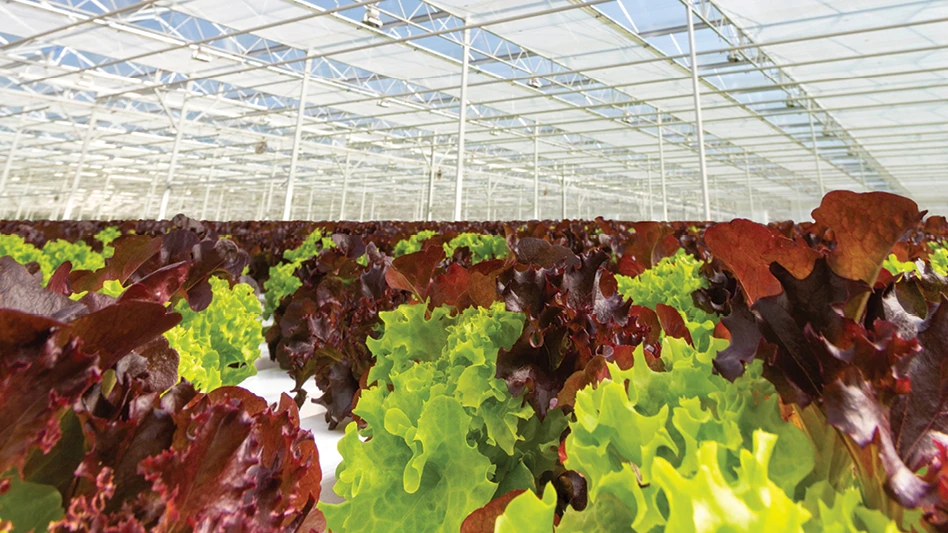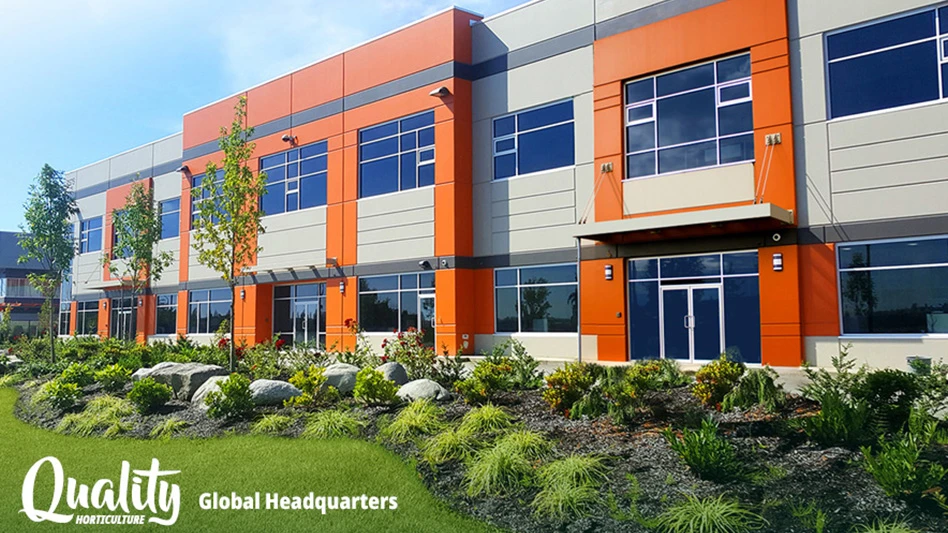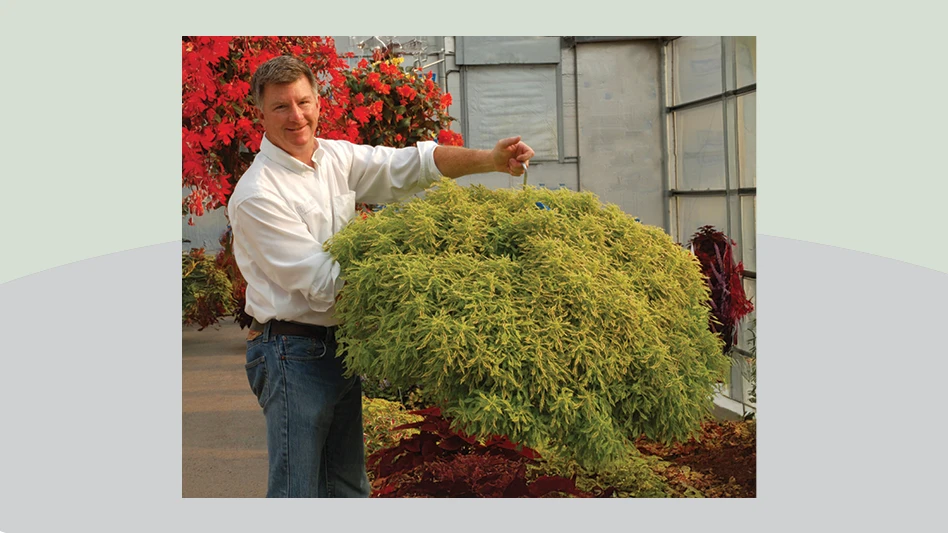
Although Dickman Farms in Auburn, N.Y., was designated as a VeriFlora-certified sustainable greenhouse operation in May, co-owners Dave and Jim Dickman know that the process doesn’t end with the designation. The brothers see sustainability as a journey, not a destination.
“It is an ongoing process, both philosophically and practically,” said Dave, who is company president. “VeriFlora certification requires an annual audit to insure that improvements to which we have committed have actually been completed. It is also a time to review and identify projects for the coming year.”
Dickman Farms is a young plant propagator and an exclusive supplier to Ball Horticultural Co. It has supplied Ball with starter material since 1979. Dickman Farms now supplies Ball with more than 2,000 items including annuals, geraniums and perennials. It has been designated a Ball Gold Supplier since the inception of the program in 2000.
“One thing that we have worked very hard at is our grower truck program,” Dave said. “We deliver over 80 percent of our product on our own trucks directly to the customers’ locations. This has made us very popular with a lot of our customers.”
 Brothers Dave (left) and Jim Dickman found operating their company in heavily-regulated New York had its advantages when it came to sustainability certification. They estimate they were already 85 precent through the certification process before they even got started. Photo by Steven Gage Productions.Dickman delivers product in its own trucks to the majority of states east of the Mississippi River. Officials at Scientific Certification Systems, which award the VeriFlora certification, were interested in how Dickman shipped its product.
Brothers Dave (left) and Jim Dickman found operating their company in heavily-regulated New York had its advantages when it came to sustainability certification. They estimate they were already 85 precent through the certification process before they even got started. Photo by Steven Gage Productions.Dickman delivers product in its own trucks to the majority of states east of the Mississippi River. Officials at Scientific Certification Systems, which award the VeriFlora certification, were interested in how Dickman shipped its product.
“They wanted to know how efficient we were at getting our product to market,” Dave said. “I had to go back through our records and actually run truck routes to provide information on how many plants were shipped on a truck and the coefficient of plants per mile.”
Starting the process
The impetus for Dickman Farms to become VeriFlora certified occurred in 2008 when Dave and Jim were approached by Ball to become one of its Certified EcoSource Suppliers.
“The process initially looked pretty daunting to us,” Dave said. “To a certain extent, if you are already operating in the states of New York or California, you are already 85 percent of the way through the certification process just because of the regulations you are working under on a daily basis.”
Dave said a big part of the certification process, which began in the summer of 2008, was getting through the VeriFlora questionnaire, which is about 100 pages.
“We talked with Dave Pruitt, who is general manager at Ball Tagawa, and he told us not to be afraid of the certification process,” Dave said. “Just as you would plan your spring production, you can’t look at what you have to do for the whole spring, which at times seems overwhelming. You have to look at how much you can accomplish every day and then start working on it.”
A team effort
Jim Dickman, who is vice president and oversees production and construction, headed up the certification process. He broke down the application into various components and assigned teams to fill out different sections based on their area of management responsibility. Some of the key components covered in the certification questionnaire were pesticide and fertilizer use, water use and runoff, consumption of utilities and fuel for heat and transportation, HR management, community relationships and financial strength. All claims made in the questionnaire had to be supported by written documentation.
“We were fortunate in that when we decided to obtain the VeriFlora certification we were just coming off of Lean Flow implementation,” Jim said. “Going through that process got everyone in the mode of thinking outside the box.”

Dickman Farms is currently trialing a new certified sustainable, biodegradable paper with its Ellegaard Ellepot machine for producing its starter plants. Installation of the machine has resulted in the use of less growing mediaand shorter crop times.Emphasis on employees
A major part of the VeriFlora questionnaire focuses on employees. Dave and Jim agreed that the easiest portion to fill out was the section on human resources.
“We work with a company called HR One that we hired five years ago to write our company handbook and job descriptions,” Dave said. “The HR section of the VeriFlora questionnaire was the easiest to fill out because we just handed it off to the company rep.”
Based on how much emphasis VeriFlora places on how a company treats its employees, Jim said it would be extremely difficult for someone to complete the questionnaire if they did not have a company manual with specific written policies.
“Someone considering applying for VeriFlora certification should probably prepare a company handbook first before attempting to go through the process,” Jim said.
The certification process helped the Dickmans improve safety procedures, including signage and developing an emergency evacuation plan.
“These were things that we did not have in place,” Jim said. “One of the things that the Scientific Certification Systems people were really impressed with is that we hire 100 percent from our local community.”
Fine tuning production
Obtaining VeriFlora certification and becoming a Ball Certified EcoSource Supplier has caused Jim and Dave to look at their business in a different way.
“It has galvanized the people in management and production together to look for sustainable solutions in all aspects of our operation,” Dave said. “While becoming certified is a one-time event, being certified is an ongoing process. It causes us to look at every task and challenges us to do it more efficiently and with less impact on the environment.”
They are paying a lot more attention to zoning the greenhouses for specific crops to save on inputs. The company’s Priva environmental computer enables the company to use DIF (difference between night and day temperatures) to control plant height, reducing the amount of growth regulators needed. All of the greenhouses are equipped with GTI irrigation booms, which have reduced water runoff.
“We consciously practice moving crops within the greenhouse so that we are not watering open concrete floors,” Dave said. “We have also installed drip irrigation on those crops in pots. This has made a substantial difference in the amount of water and fertilizer we use resulting in a 35 percent reduction.”
The Dickmans’ latest project is to build a 2-acre retention pond. The collected water will irrigate nursery crops. The company has obtained funding through a federal EPA water quality program to construct the pond and install an irrigation system.
“We are tying in all of our floor drains, pumping the water to the pond, which has to be constructed, and installing an irrigation system for pumping water out of the pond,” Dave said. “We’ll also need a stormwater prevention plan. Even though we sit on 60 acres, we are surrounded by residential neighborhoods.”
For more: Dickman Farms Greenhouses & Garden Center, (800) 513-3032; www.dickmanfarms.com.
| Dickman Farms Greenhouses & Garden Center |
| Founded: In 1903 by Theodore, Louise and Herman Dickman. Location: 60-acre site in Auburn, N.Y. Crops: Dickman Farms is a Ball Horticultural Co. Certified EcoSource Supplier and Gold Supplier. The company propagates more than 2,000 items including annuals, geraniums and perennials, accounting for 60 percent of its production. Finished crops, including annuals, perennials, ground covers, herbs, hanging baskets and garden mums, account for 40 percent of production. Production space: 400,000 square feet of Westbrook Apex greenhouses and more than 6 acres of outdoor production. Market: Wholesale sales include 9.5 million starter plants sold to growers throughout North America and finished product sold to more than 80 independent garden centers within a 400-mile radius. The company also operates its own 26,000-square-foot retail garden center and 3-acre nursery yard. Employees: 40 full-time employees (including the garden center) and 30 seasonal employees. Sustainability highlights: 365,000 square feet of greenhouse space has been equipped with GTI irrigation booms for starter material; drip irrigation is used on container crops; greenhouses are controlled with a Priva environmental computer and are zoned to save on energy and other inputs; the company has been operating an Ellegaard Ellepot machine for two years to produce its starter plants, resulting in reduced soil use and shorter crop times; products including BotaniGard and RootShield are used in crop rotations to reduce the use of traditional insect and disease controls; most of the containers the company is using contain 75 percent recycled plastic; used plastic trays are shipped to Blackmore Co. for recycling; Daniels 10-4-3 Professional Plant Food is used on all vegetables transplants and is currently being trialed on the starter plants. |

Explore the November 2009 Issue
Check out more from this issue and find your next story to read.
Latest from Greenhouse Management
- Happy holidays from the GIE Media Horticulture Group!
- North Carolina Nursery & Landscape Association announces new executive vice president
- Plant Development Services, Inc. unveils plant varieties debuting in 2025
- Promo kit available to celebrate first National Wave Day on May 3
- Applications now open for American Floral Endowment graduate scholarships
- Endless Summer Hydrangeas celebrates 20 years with community plantings
- Invest in silver
- Garden Center magazine announces dates for 2025 Garden Center Conference & Expo





